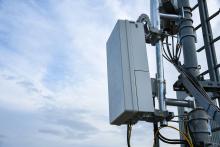Ed Thomas, the FCC's chief engineer, said current technology can avoid interference problems. Services such as WiFi, which provide wireless Internet connections, can sense when a frequency is being used and scan for another available pocket of spectrum. That technology, Thomas said, can be expanded to the television spectrum to avoid interference.
Under the plan, wireless companies would be allowed access to the unused airwaves in local areas between channels 5 and 51, with a few exceptions.
The frequencies available involve spectrum below 700 megahertz, Thomas said. These lower frequency bands allow signals to travel farther, easily penetrating walls, trees and other obstructions through which higher frequencies cannot pass.
Wireless users would not have to obtain spectrum licenses, but could only operate in the unused bands in a way that causes no interference with licensed broadcast users, the FCC said.
Consumer and industry groups praised the agency's proposal.
"From poor inner-city neighborhoods to rural areas where cable and DSL (digital subscriber line) don't find it profitable to deploy, this empowers citizens to construct networks they need, available when they want them," said Harold Feld, associate director at the Media Access Project, a public interest law firm that represents consumer groups on telecommunications issues.








